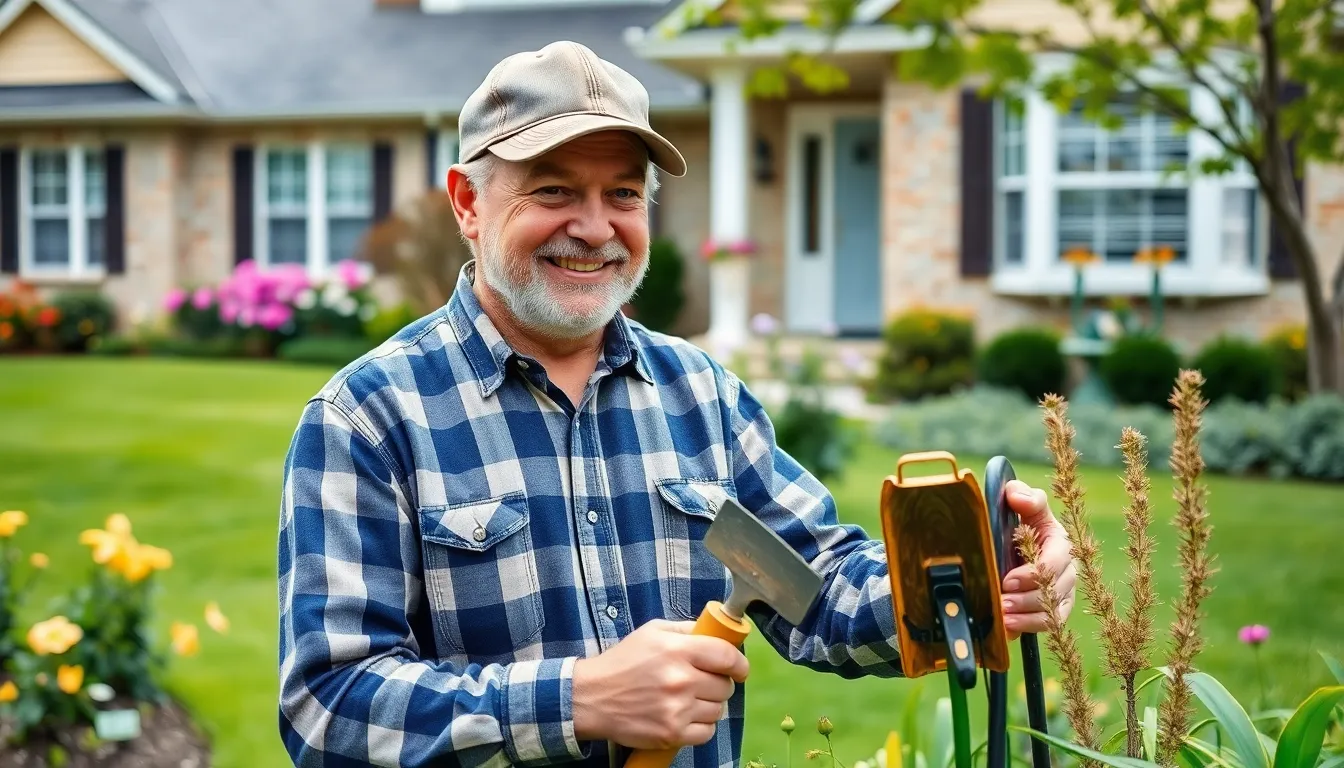Table of Contents
ToggleOwning a home is a rewarding experience, but it comes with its share of challenges. From maintenance tasks to budgeting for unexpected repairs, homeowners often find themselves navigating a maze of responsibilities. With the right tips and strategies, it’s possible to simplify this journey and make homeownership more enjoyable.
This article explores essential homeowner tips that can help anyone maintain their property effectively and efficiently. Whether it’s about enhancing curb appeal or tackling seasonal maintenance, these insights will empower homeowners to take control of their living spaces. With a little knowledge and preparation, they can protect their investment and create a comfortable haven for their families.
Essential Homeowner Tips
- Conduct regular maintenance. Schedule seasonal checkups for critical systems like HVAC and plumbing to prevent costly repairs. Focus on tasks like gutter cleaning, roof inspections, and servicing appliances.
- Create a budget for home expenses. Allocate funds for both expected and unexpected maintenance costs. Track monthly utility bills and set aside 1-3% of the home’s value for repairs and upgrades.
- Prioritize curb appeal. Maintain landscaping by trimming trees and shrubs, mowing lawns, and planting seasonal flowers. Clean driveways and walkways to enhance exterior appearance.
- Invest in energy efficiency. Upgrade to energy-efficient appliances and inspect insulation to lower utility costs. Consider installing programmable thermostats and sealing windows and doors to improve efficiency.
- Document home improvements. Keep records of renovations and maintenance tasks for future reference. This habit makes it easier to track investments and increases the home’s resale value.
- Establish a home inventory. Create a detailed list of personal belongings and their values. Use photographs or videos to document the condition of items for insurance purposes.
- Know emergency procedures. Familiarize homeowners with the location of shut-off valves and circuit breakers. Create an emergency kit containing first-aid supplies, flashlights, and extra batteries.
- Engage with neighbors. Build relationships with neighbors for a supportive community. Exchange contact information and create a neighborhood watch to enhance security and safety.
- Plan for seasonal changes. Prepare for winter by insulating pipes and checking heating systems. In spring, check for leaks, clean windows, and prepare the home for warmer weather.
- Research local resources. Identify available community services for homeowners, such as repair assistance programs and local contractors. This knowledge aids in quick resolutions for home-related issues.
Maintenance Tips for Homeowners

Homeowners can simplify their maintenance responsibilities by staying organized and proactive. Regular attention to tasks not only preserves property value but also enhances comfort.
Seasonal Maintenance Checklist
- Spring: Inspect gutters for debris; clean and repair as needed. Test irrigation systems and service lawn equipment. Trim trees and shrubbery to promote healthy growth.
- Summer: Check exterior paint and siding for damage, making repairs to prevent water intrusion. Inspect HVAC systems, replace filters, and clean ducts to ensure efficiency during peak usage.
- Fall: Prepare heating systems for winter by scheduling professional checkups. Clean gutters and ensure downspouts direct water away from foundations. Seal windows and doors to improve insulation.
- Winter: Monitor indoor humidity levels to prevent mold; use humidifiers if necessary. Inspect roofs for snow accumulation and clear away ice dams. Test smoke and carbon monoxide detectors.
Common Home Repairs
- Leaky Faucets: Often caused by worn washers or seals, these can be fixed by replacing the necessary parts. Addressing leaks promptly saves water and money.
- Running Toilets: Flapper valves typically cause this issue. Replacing the valve can remedy the problem, preventing higher water bills.
- Drafty Windows: Improper seals create drafts. Applying weather stripping or caulk can improve energy efficiency and comfort.
- Clogged Drains: Regularly cleaning drains can prevent clogs. For stubborn blockages, using a plunger or a plumber’s snake is advisable.
- Squeaky Floors: Floorboards rubbing against each other can cause squeaks. Adding lubricants or securing loose boards can resolve this issue.
By following a structured maintenance approach and addressing repairs promptly, homeowners can maintain their properties effectively.
Financial Tips for Homeowners
Homeownership involves numerous financial responsibilities. Homeowners must effectively manage income and expenses to maintain their investment.
Budgeting for Home Expenses
Budgeting plays a crucial role in homeownership. Homeowners should create a detailed budget that accounts for fixed expenses such as mortgage payments, property taxes, and utilities. Variable expenses, like maintenance and home improvements, also require attention.
Homeowners can follow these budgeting tips:
- Track Monthly Expenses: Document all home-related expenses to identify spending patterns.
- Allocate for Maintenance: Set aside 1% to 2% of the home’s value annually for maintenance and repairs.
- Prepare for Emergencies: Establish an emergency fund that covers 3 to 6 months of living expenses to manage unexpected costs.
By adopting these strategies, homeowners can mitigate financial stress and ensure smooth budgeting.
Understanding Home Insurance
Home insurance protects against financial loss from damage or liability. Homeowners must grasp their policy details to ensure adequate coverage.
Key aspects to consider include:
- Coverage Types: Know the difference between dwelling, personal property, and liability coverage.
- Policy Limits: Ensure policy limits reflect the current value of the home and its contents.
- Deductibles: Understand the deductible amount, which determines the out-of-pocket cost during a claim.
Reviewing these components helps homeowners tailor their insurance to meet specific needs. Regular policy evaluations can lead to potential savings through discounts for safe home features or bundled policies with auto insurance.
Home Improvement Tips
Home improvements enhance aesthetics and functionality, adding value to properties. Homeowners can consider various renovations to achieve their goals.
Choosing the Right Renovations
Homeowners must select renovations that align with their needs and budgets. Prioritize high-impact areas like kitchens and bathrooms, as they typically yield higher returns on investment. Research current trends, such as open floor plans or eco-friendly materials, to increase appeal. It’s essential to evaluate resale value, considering updates like energy-efficient windows or upgraded roofing. Consult local real estate agents for targeted insights on what renovations attract buyers in specific neighborhoods.
DIY vs. Hiring Professionals
Deciding between DIY projects and hiring professionals hinges on the complexity of the task and the homeowner’s skill level. Simple tasks, like painting or landscaping, can typically be handled by homeowners, saving costs. For tasks requiring specialized knowledge, such as electrical work or plumbing, hiring licensed professionals is advisable to ensure safety and compliance with codes. Budget constraints often influence this decision; a balance between DIY savings and professional results enhances overall satisfaction. When uncertain, seeking advice from professionals can provide clarity on the best approach for home improvements.
Safety Tips for Homeowners
Homeowners must prioritize safety to protect themselves and their property. Implementing effective security measures and fire safety precautions enhances overall well-being and minimizes risks.
Home Security Measures
Homeowners should install deadbolt locks on all exterior doors to strengthen security. Utilizing a security system with alarms and cameras provides real-time monitoring, deterring intruders. Additionally, keeping windows locked and using window sensors can prevent break-ins.
Regularly trimming bushes and trees near entrances helps eliminate hiding spots for burglars. Homeowners must participate in neighborhood watch programs to foster community vigilance and report suspicious activities. Choosing motion-activated lights for outdoor areas enhances visibility during nighttime.
Investing in smart home technology, such as smart locks and video doorbells, allows homeowners to monitor their property remotely. Homeowners should also create a routine for checking their smoke detectors and carbon monoxide detectors monthly to ensure effective functioning.
Fire Safety Precautions
Homeowners need to install smoke detectors on every level of their home, especially near sleeping areas. Regularly testing these detectors and replacing batteries annually keeps them in working order. Homeowners must also have a fire extinguisher in the kitchen and designated areas throughout the home, ensuring easy access in emergencies.
Establishing and practicing a fire escape plan helps prepare family members for quick and safe evacuations. Homeowners should identify two exits from each room and designate a safe meeting point outside.
Additionally, avoiding the use of overloaded electrical outlets and ensuring flammable materials are stored away from heat sources significantly reduces fire risks. Keep an eye on the expiration date for items like fire extinguishers, as replacing them regularly maintains their effectiveness in emergency situations.
Homeownership is a journey filled with both rewards and challenges. By implementing the tips shared throughout the article, homeowners can navigate their responsibilities with greater ease. Regular maintenance budgeting for repairs and enhancing curb appeal are crucial steps that contribute to a well-maintained property.
Fostering a sense of community and staying informed about local resources can also make a significant difference. Prioritizing safety and security measures ensures peace of mind. With a proactive approach and careful planning homeowners can protect their investment while creating a welcoming space for their families. Embracing these strategies leads to a more enjoyable homeownership experience.





